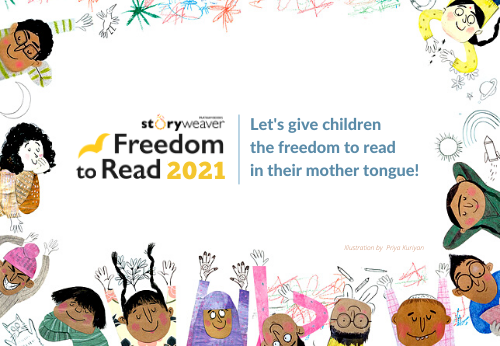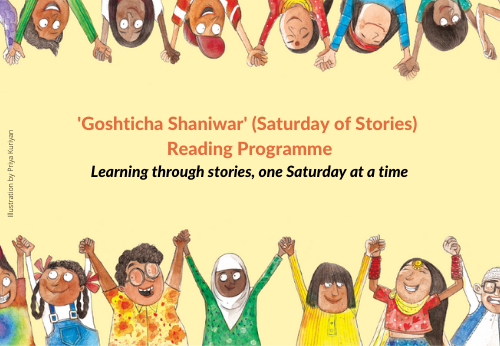Celebrating the impact of the 'Goshticha Shaniwar' (Saturday of Stories) Reading Programme!
Posted by Pallavi Kamath on March 20, 2021About the ‘Goshticha Shaniwar’ Reading Programme
2020 was a year like no other. All over the world, the shadow of COVID-19 loomed large. Schools and students had to find and adapt to new channels and ways of learning from home. In Maharashtra, India, 53 lakh students of government schools and anganwadis were affected, and had to cope with a challenging learning environment and the stresses of COVID-19.
Pratham Books’ StoryWeaver, the State Council of Educational Research & Training, Maharashtra (SCERT), Integrated Child Development Services (ICDS), and UNICEF joined hands to co-create the ‘Goshticha Shaniwar’ (Saturday of Stories) Reading Programme for the children of Maharashtra, to encourage learning through stories, while addressing children’s socio-emotional needs.
‘Goshticha Shaniwar’ was launched in October 2020, and for 5 months, provided free high-quality reading material every week to students from grades 1 to 8, across the state of Maharashtra. Every Saturday, one storybook in Marathi was shared for anganwadi children. A set of four age-appropriate storybooks in each of the three languages: Marathi, Urdu, and English, was shared with children in grades 1 to 8. These e-books were curated by the StoryWeaver team, and were then shared via WhatsApp with children - through Supervisors and Anganwadi Workers in the case of ICDS, and by District Coordinators (from DIETs), Block Resource Persons, Cluster Leaders, and teachers, in the case of school children. These digital storybooks were supported by posters, and interesting activities based on concepts from the stories, to encourage greater involvement.
Since the books were openly licensed, they were free to read, download, print, project, adapt and share. This allowed for projection in places that had TVs or screens, printouts to be distributed, and several grassroot level innovations like the Bicycle Library of Gadchiroli. To bridge the digital divide and reach those who did not have internet or smartphones, stories were also delivered through Pratham Books’ audio stories initiative: ‘Missed Call Dya, Ani Goshta Aika’ (‘Give a Missed call, Listen to a Story’).
Programme Impact
5 months
36 districts of Maharashtra
1 lakh schools and anganwadis
2.6 lakh teachers, anganwadi supervisors and workers
25 lakh children
The ‘Goshticha Shaniwar’ Reading Programme has demonstrated beyond doubt the benefits of integrating joyful reading into the child’s daily routine. The implementation of this Programme has provided us with directions for newer, more innovative ways of reaching children even in the most remote areas. It has also highlighted the strengths of conceptualising, implementing, and monitoring a reading programme in close partnership with all its stakeholders.
Engaging, contextualised storybooks can play a great role in building foundational reading skills, and help children learn, grow and achieve their potential. The stakeholder network and open licensed content from platforms like StoryWeaver can help provide uninterrupted online and offline access to high-quality storybooks in multiple languages. If we are to achieve foundational literacy and numeracy for every Indian child studying in Grades 1 to 3 by 2025, we shall need to make reading a part of her timetable, every single day.
World Storytelling Day 2021
StoryWeaver, SCERT, ICDS and UNICEF are marking World Storytelling Day 2021 with an online symposium to celebrate the success of the ‘Goshticha Shaniwar’ Reading Programme.
The symposium will feature a panel discussion on ‘Reading for Joy & Language Proficiency’ and remarks from leadership from SCERT, UNICEF, Pratham Books, award-winning author Mr. Rajiv Tambe, Mr. Mangesh Gondavale, CEO, Zilla Parishad (Aurangabad), Mr. Dhir Jhingran, Founder & Director, Language and Learning Foundation. The symposium will be addressed by Ms. Varsha Gaikwad, Minister, School Education & Sports (Maharashtra) and Ms. Vandana Krishna, IAS, Additional Chief Secretary, School Education (Maharashtra). The event will also include the unveiling of a book that captures the ‘Goshticha Shaniwar’ model, impact and sustainability, and caselets from the field.
Watch the symposium online on March 20, 2021 at 11 am: https://www.youtube.com/watch?v=icvmbmPjbGI
comments (2)
Calling for applications to the Freedom to Read 2021 campaign!
Posted by Pallavi Kamath on February 21, 2021International Mother Language Day is celebrated annually on 21 February to promote awareness of linguistic and cultural diversity, and multilingualism.
The ability to read is the ability to learn, to explore, and to imagine. But without books to read, how will children become readers?
 .
.
This year, we look forward to collaborating with government education departments, state education ministries, government language and culture promotion boards, civil society organisations, language promotion organisations, NGOs and large advocacy groups that work with children.
StoryWeaver will train and skill each of the selected partners to translate and share an open digital library of at least 50 high-quality books, in a language of their choice.
How will we do this?
-
By supporting our partners with the selection of suitable books for their children. The books encompass a range of reading levels and themes, including Early Readers, Bilinguals, STEM storybooks, as well as the Curated Reading Programme.
-
Training them to translate quickly and efficiently.
-
Conducting editorial masterclasses tailored to their needs, and more
Application timelines and guidelines
-
The last date for applications: March 07, 2021
-
Pratham Books reserves the final rights to select partners.
-
Selected partners will sign a letter of understanding with Pratham Books.
-
Only selected partners will be eligible for translation support and mentoring.
-
Applications for building digital libraries in languages with few or no books will be given preference over those in mainstream languages or languages that already have a digital library of 100 storybooks on StoryWeaver.
-
Applicants with basic digital infrastructure and language resources to create a local digital library will also be given preference.
-
All content created and published by you / your organisation on StoryWeaver as part of the 'Freedom to Read 2020' campaign will by default be licensed under CC BY 4.0.
Fill up the application form here: APPLY NOW
If you have any queries about Freedom to Read 2021, you can access the FAQs here or write to us at [email protected], or send us a message on WhatsApp at +91-9886110408.
The Story of Us: The Teachers & Educators 2018 Solver Class
Posted by Pallavi Krishnan on December 14, 2018written by Purvi Shah, Head - Digital Initiatives, Pratham Books
Earlier this year, MIT Solve asked the question 'How can teachers and educators provide accessible, personalized, and creative learning experiences for all?' More than 400 innovators from nearly 80 countries around the globe submitted solutions from which StoryWeaver was chosen to be one of the eight members to work on the challenge.
Take a look at the StoryWeaver pitch at the Finals and I'll tell you the story of the Teachers & Educators Solver Class of 2018.
The day after Solve Challenge Finals, eight individuals from all across the world sat huddled with coffees and a shot of inspiration on a cold New York morning, sharing the stories of the journeys that led us to that very room. We had just been selected as the new Teachers & Educators Solver class, and our orientation session was nothing short of invigorating, lighting a spark in each of us.
It was humbling to see that while we came from different countries and different backgrounds, our stories were similar, deeply rooted in our personal experiences. Yet we were all working towards a common goal: creating affordable, accessible, high-quality resources to educate our children.
My Story: How Stories Can Transform a Child
Personally, my mother has always stood up for me and for what is right. Growing up, this gave me the utmost confidence to be—and do—what I wanted. It also made me wonder what part I could play in making sure that every child lived her life with the same sense of security and confidence.
I’ve worked with Pratham Books, a unique nonprofit children’s book publishing house, whose mission is to put a book in every child’s hand, for 12 years now. I know that most underserved children are first generation readers and don’t have access to quality education.
Even more troubling is that their parents are often not equipped to help empower their children's learning. To support these children, we need to entrust this responsibility to their next circle of influence, their teachers, and give these teachers all the support they need.
This is why I am excited to lead the StoryWeaver platform for Pratham Books. StoryWeaver’s innovative publishing model addresses the inequality that exists globally—not enough children’s books, in not enough languages, with issues of poor access and affordability.
The platform provides open access to a large repository of storybooks, and has tools that allow the content to be translated and versioned to suit local needs. StoryWeaver has stories in tribal and endangered languages, and stories on overcoming domestic violence, civil rights, and STEM, which inspire children to learn effectively and dream big.
StoryWeaver puts the power in the hands of teachers to use, create, and adapt reading resources that help transform children.
Their Stories: Seven Inspiring Solutions
Carlos Pereira’s 11-year-old daughter, Clara, has cerebral palsy, making it impossible for her to walk or speak. Carlos spent a lot of time educating himself about his daughter’s disability. From there on, he built a series of services for people with disabilities. One of them is Livox, a software for Android tablets that uses machine learning and artificial intelligence that enables people with speech-related disabilities to communicate up to 20 times faster.
Having migrated from Korea to London, Heejae Lim understood the challenges faced by migrant parents. She founded TalkingPoints, an education technology nonprofit with a mission to make it easy for any parent to be actively engaged in their child’s education. The multilingual communication platform allows parents to communicate with teachers across language barriers.
Melissa Corto grew up with a special needs sibling and having worked extensively in the space, she knew that technology could aid special educators in effective teaching to improve results. She founded Education Modified to empower teachers with the latest research-based instructional strategies to effectively implement students’ Individualized Education Programs (IEP).
Passionate about seeing hands-on education manifest around the world, Heather Beem moved from her base in Boston to Ghana to start Practical Education Network, an organization that equips West African STEM teachers to employ inquiry-based pedagogies in their classrooms, using low-cost, locally-available materials.
Priya Lakhani founded Century Tech as a way to solve the crisis levels of student underachievement and teacher workload burden in the UK. Century is an educational platform that provides personalized learning for students, leveling the playing field by improving learning outcomes for all users. It empowers teachers with the right tools to deliver meaningful education.
Rudolph Ampofo went through the complete cycle of the Ghanaian education system, throughout which he always felt that he and his peers had limited access to education resources. Rudolph currently leads Eneza Education Ghana, an organization working towards improving access to quality and affordable educational resources by leveraging SMS, USSD, and web applications.
When she was 20 years old, Audrey Cheng moved to Kenya to work in venture capital. She quickly noticed that most tech experts in Kenya were self-taught, while many university IT grads could not find jobs. She realized that universities taught outdated skills that did not match the needs of companies, so she founded Moringa School to provide young Africans with in-demand digital skills to advance their careers.
The Story We Wish to Write
Each one of us Solver teams are inspired to do what we do because of our unique experiences. We left the Solver orientation session with not only a fresh view of our work, but also with new ideas, theories, plans, and designs to work towards our common goal: supporting the valuable resources that educate our children.
So, as the year progresses, we hope to partner to work towards achieving the UN Sustainable Development Goal which aims to “ensure inclusive and equitable quality education and promote lifelong learning opportunities for all.”
comment (1)

